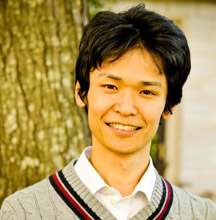Akihiro Eguchi

Honors student Akihiro Eguchi wants to design a kinder, gentler robot. Inspired by
Astro Boy, the robot manga hero from the 50s who was wildly popular in Akihiro’s native Japan,
or AIBO, a robotic pet capable of learning, he’d like to program a robot that could
keep a child company until his parents come home – and get a few household chores
accomplished as well. “In America, robots tend to be martial, like Terminator. In
Japan, if a robot has a mind, he can be a good friend,” Akihiro said. To achieve his
dream of programming artificial intelligence, Akihiro is putting in extra credit hours
to earn a double major in computer science and psychology. He began by working with
engineering professor Craig Thompson to develop “smart objects” in Second Life, an online virtual environment. “In the
virtual world, it’s a difficult task for the computer to tell the difference between
a desk and a chair,” Akihiro said. “We identified each object with an RFID tag so
that the computer could recognize it easily.” In the real world, this technology would
allow a user lounging on the couch to change the channel, adjust the temperature in
the room, and send an email – all by pointing a smart phone at the television. With
support from an Honors College research travel grant supplemented by funding from Professor Thompson, Akihiro presented this research
at a computer engineering conference in Freiburg, Germany.
While Akihiro welcomes the ease and economy of designing in Second Life, he is ready
to design real world applications using programming languages such as Java, C#, and
LISP. In his senior capstone engineering course, he is working with two other students
to develop an autonomous floor-mopping robot that can figure out the most efficient
mopping route, identify objects it encounters and perform other household tasks, as
well. He’s also preparing to tackle knottier problems in artificial intelligence by
studying how babies acquire language under the direction of Douglas Behrend, chair of the psychology department. The first step involves distinguishing between nature and nurture. “Innate knowledge
is easier for programmers because they can simply enter data,” Akihiro said. “But
learned behavior, this is more difficult. We have to find a good mechanism for that.”